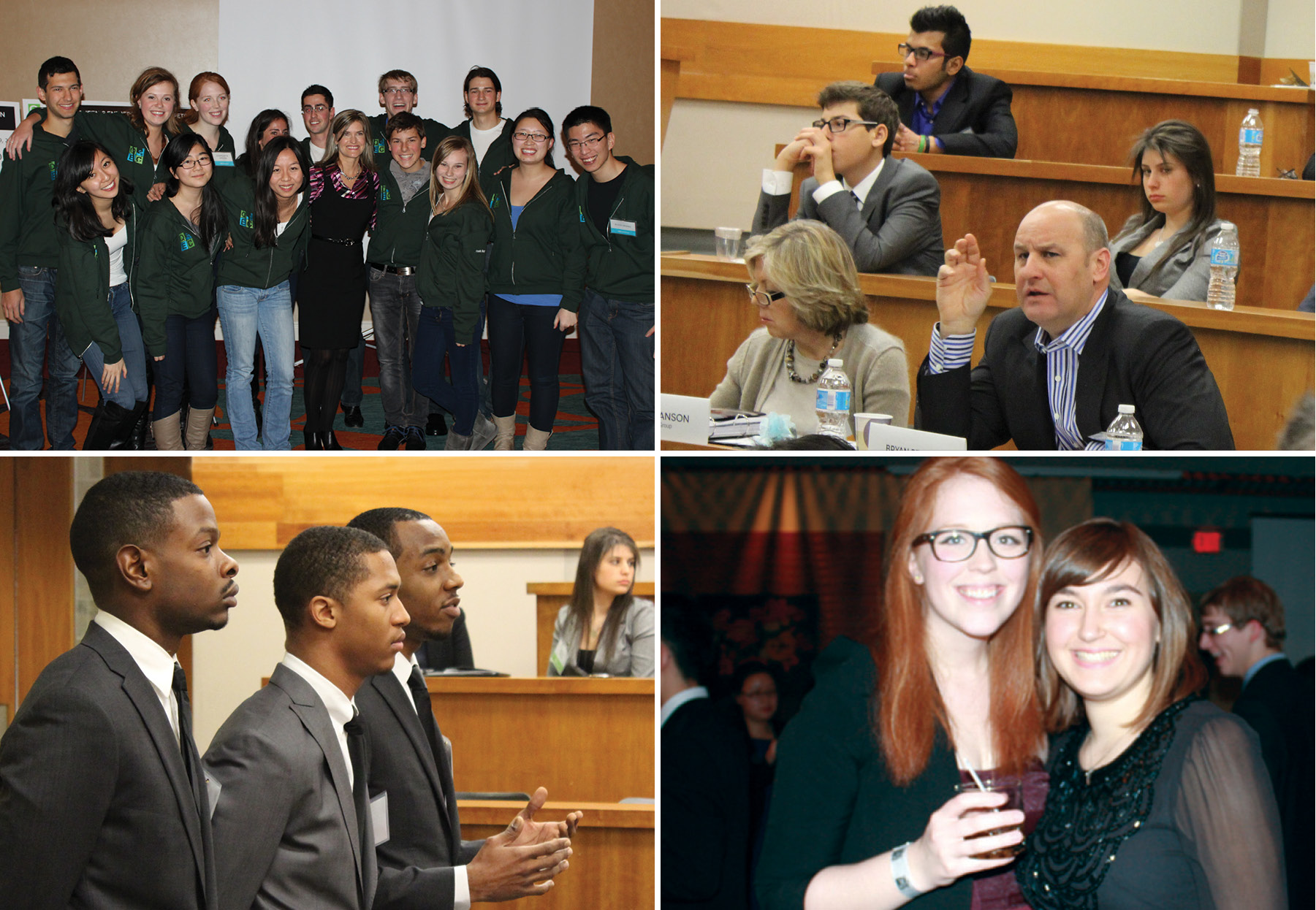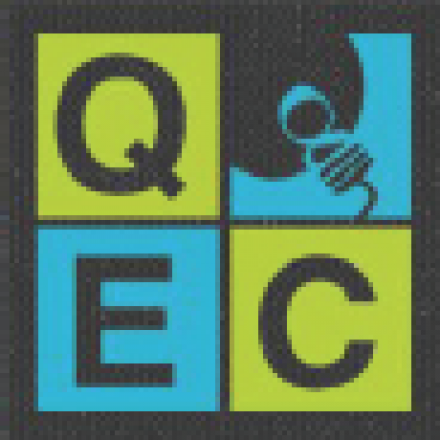From Bagel Trucks To Lab Mice Software

Low tech meets high tech when comparing the bagel truck brainchild of Gerald Risk and Robert Guarasci (both BCom’90s), to an iPad and web application that allows researchers to track experimental data on lab mice. Both ventures won the top prizes when they competed, 25 years apart, at the Queen’s Entrepreneurs’ Competition (QEC). Gerald and Robert collected $1,000 by beating out seven other teams from several Queen’s faculties at the first QEC. The 2013 winners, University of Chicago students Mohamad Abdallah and Usman Akhter, took home $16,000 as first place and innovation prize winners, besting 15 teams from Australia, Bangladesh, Canada, China and the U.S. at the Final Weekend held in January.
Gerald and Robert’s bagel venture never saw the light of day, but their $1,000 top prize helped plant the seeds for later career choices in the entrepreneurial space (see sidebar at right). In contrast, Mohamad and Usman have already signed up more than 100 research labs to alpha test their MouseHouse software and are using their QEC prize money to continue to grow their business.
As the QEC’s founder at the inaugural event in 1989 and as a judge and speaker in 2013, Meredith (Quinn) Van Binsbergen, BCom’90, was a witness to the presentations that pitched each of these new ventures. In her role as the Commerce Society’s Careers and Alumni Commissioner in 1988-89, she had argued successfully that an entrepreneurs’ competition should be added to the mix of ComSoc events. “There were accounting, marketing and finance conferences, but nothing for students who had business ideas of their own,” she says.
The first QEC operated on a shoestring budget and was open to Queen’s students only. Meredith and six fellow Commerce students organized the one-day event, which featured two speakers and a gala dinner. Twenty-five years later, the QEC attracted business plans from 40 teams from around the world for the preliminary round, with the top 18 invited to attend the two-day Final Weekend.
“I am amazed and delighted that the QEC has thrived since our inaugural year,” says Meredith. “The international reach, high number of participating teams and the sophistication of the business ventures put forward reflect that the entrepreneurial spirit is alive and well among today’s university students.”
While the QEC has grown exponentially from its early days, the vision remains the same: to foster innovation and provide aspiring entrepreneurs with the opportunities they need to turn their ideas into reality. While the $25,000 in cash prizes is an obvious motivator, 2013 co-chairs David Warshafsky, BCom’13, and Ken Sekiguchi, Comm’14, emphasize the unrivalled learning opportunity the event affords all who participate. “The QEC Final Weekend never fails to foster a vibrant exchange of ideas, unparalleled innovation, and the beginning of new relationships,” they write in the introduction to the QEC’s Delegate Handbook, which includes a greeting from Prime Minister Stephen Harper.
The handbook is also a veritable Who’s Who of some of Canada’s top business leaders. Among this year’s complement of 30 were Bryan Pearson, MBA’88, BSc’86, President of LoyaltyOne (see his profile in the Winter 2013 issue); Steve Bollinger, BCom’83, Senior VP of Marketing for Constellation Brands, Canada’s leading wine company; and Grant Rasmussen, BCom’87, Senior VP, CIBC Retail Bank.
Not only do the judges and speakers brave Kingston’s blustery January weather, they also cover their own transportation and accommodation expenses. They must not begrudge either the expense or the frigid January temperatures since so many return year after year, often citing how much they enjoy the experience. “QEC allows corporate executives to get away from meetings where a lot of time is spent on discussing why things can’t be done,” says Grant Rasmussen. “In contrast, we come to an environment where dreaming is encouraged and opportunities abound, and we leave feeling our batteries have been recharged. It’s also incredibly motivating to realize that your own organization would be lucky to have any one of the team members join it.”
Another judge, Bob Shoniker, MBA’70, has returned often, not only to lend his expertise to the panel, but also to keep an eye on his investment. In 2010, to mark their 40th anniversary, Bob and his classmates donated $125,000 to help fund the QEC over a five-year period. “I’ve been extremely impressed by the calibre of the competitors,” he says, noting the number of finalists who already have businesses up and running by the time they pitch their ventures at the QEC.
One such venture is TDot Performance, the third-place winner in 2013, led by Ryerson Commerce student Charith Perera. This e-commerce retailer of automotive parts caters to car enthusiasts keen to customize their vehicles at a reasonable price while avoiding the hassle of ordering products from foreign suppliers. In its first year of operation, the company hit the $1-million mark in sales and is on track to double its numbers in 2013.
Team FishCycle impressed the judges with its plan to recycle fish by-products into animal feed and nutritional supplements. Biomedical engineering students Albert Hu and Mike Du from Duke University in Durham, North Carolina, recognized an opportunity when researching the wild-fish harvesting industry in Alaska, which yields more than one billion pounds of wild fish per year. Most fish-processing plants there don’t have the capacity or incentive to recycle fish by-products, so these are thrown back into the ocean, altering the ecology and creating environmental challenges. Meanwhile, the nutritional-supplement industry is growing and farmers, particularly in China, are finding animal feed increasingly expensive. FishCycle aims to marry supply and demand of this underdeveloped resource. In addition to its $6,000 second-place prize, the team also captured the Sustainability Award of $1,000, funded by Dr. Grant Bartlett, a veteran of oil-patch new ventures, former QSB Entrepreneur- in-Residence, and past professor in Queen’s Department of Geological Sciences.
Although the MouseHouse team captured top honours, the going wasn’t easy when Mohamad and Usman faced the judging panel after their 20-minute pitch during the final-round presentations on the Saturday morning. The team had shown that its software solution would save researchers $60,000 per year, per lab — money that could be better spent on research. Several judges critiqued their projections, suggesting the pair had underestimated the market and should consider increasing their margins. There was some levity, too. One judge asked, “How do you fill the execution gap? And don’t tell me you’ll just build a better mousetrap!”
Michael Warshafsky, a second-year Queen’s biology major, received in-kind legal services valued at $1,000 for his venture, Encore — a mobile application that enhances the concert experience before, during and after the show. He also made some invaluable connections. “The competition was fantastic and acted as a kick-starter for Encore,” he says. “I’ve teamed up with another competitor I met at the QEC, Nick Klimchuk, BCom’13, as well as a talented developer. We worked super hard for weeks and are now part of The Next 36!” He’ll be able to learn from Jane Wu, a past participant in this national young entrepreneurs’ program. (See her profile in this issue.)
Another team has also reaped the benefits of participating in the QEC. Golden Eye Recruiting, a venture fronted by four students at Howard University in Washington, D.C., made it to the Top 6 with its online platform for high school football players to showcase their talents to college coaches. Says Raleigh Fatoki, “Participating in QEC was our first trip to Canada and an experience we will remember forever. Even though we didn’t leave with prize money, it was a great learning opportunity that definitely helped us further develop the business. Because of QEC, our university offered us office space when we returned and that has been such a blessing. Our QEC experience helped validate our idea, but also gave us ideas to improve upon it.”
Share Your QEC Experience
Were you a QEC chair or on the executive, a volunteer or competitor? Share your story with QSB Magazine online at qsb.ca/magazine.qec or email spleiter@business.queensu.ca. Photos are welcome! The records are very sketchy on past QEC events. Future generations of organizers would welcome your insights, anecdotes, and, especially, your photos. We’ll publish a sample of these in the next issue.
- 1 of 2
- ›

